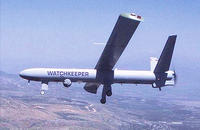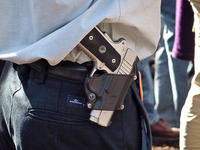-
Growing suicide trend poses risk to first responders
In a growing trend, people in the United States are increasingly using dangerous chemicals to commit suicide; this trend puts first responders at risk by exposing them to deadly chemicals; in 2008 a Japanese girl released fumes that sickened ninety people in a chemical suicide attempt; responding to these suicide attempts is also costly as hazmat team materials are expensive to replace and removing contaminated vehicles requires hiring a private company
-
-
China's increasing military might causes concern in Asia, West
China’s recent test flight of its first stealth fighter comes as part of a larger military buildup that is concerning its Asian neighbors and the West; the Chinese test of their first fifth generation stealth fighter is years ahead of U.S. intelligence predictions; China is also moving ahead with the construction of its first aircraft carrier as well as other capabilities like a “carrier killing” ballistic missile; in response to China’s stealth fighter test, Taiwan test-fired nineteen missiles; nearly a third of the missiles failed; it is unclear what China’s intentions are though leaders claim these weapons are for self-defense
-
-
U.K. government spent millions on botched spy ring
The U.K. government spends £5 million a year to operate the NPOIU, which monitors domestic environmental and animal rights activists; the NPOIU has been hit with a series of scandals after it was revealed that one of its spies began actively to aid the group he was sent to monitor; the operation led to the failed trial of six activists after the agent offered evidence in their favor; the unit has been stripped of its funding and placed under the command of the Metropolitan Police; the unit was previously run by a private entity
-
-
Proposals to enhance lawmakers' security questioned
Lawmakers have offered many new measures to protect members of Congress from attempts on their lives; some call for better protection of politicians by local law enforcement; Representative Peter King (R-New York) would make it illegal to carry a firearm within 1,000 feet of a federal official; another proposal is to erect a blast shield around the gallery in the House of Representatives and the Senate; critics of these proposals say that at end of the day, none is going to deter a determined assassin bent on killing a public official
-
-
Pointing lasers at aircraft a growing problem
According to the FBI, in 2008 there were approximately 1,000 instances of people aiming laser pointers at the pilots of aircraft; in the eight month period from January to August of 2010, there were 1,700 reported incidents, demonstrating an increasing trend in the cases; the light emitted by a laser pointer can then be directed toward and seen by a pilot, causing visual impairment such as glare on the windshield of the aircraft as well as flash blindness and after-images like the kind that can be experienced after a flash picture is taken; even if the beam does not hit the pilot directly causing temporary blindness, the beam can be distracting at times when distractions can be deadly
-
-
Lubricant in fingermarks identifies sexual offenders
There has been an increase in the use of condoms by sexual offenders, likely due to both to the risk of sexually transmitted diseases and to prevent the transfer of DNA evidence — but sexual offenders hoping to outsmart police by using a condom during their crimes may be out of luck thanks to a technique: the technique is claimed to provide proof of contact with a condom, placing someone accused of a sexual offence at the scene of the crime
-
-
Olof Palme's killer is still alive
One of the greatest mysteries in post-Second World War Europe may be a step closer to resolution; on 28 February 1986, Swedish prime minister Olof Palme was shot and killed while strolling down a busy Stockholm street with his wife Lisbet; despite tens of thousands of tips and leads in the almost twenty-four years since the crime, the murder has never been solved, and the weapon, a .357 Magnum revolver, has never been found
-
-
Boom in Pakistan's private security industry
Pakistan’s deteriorating law and order has led to a boom in the private security industry in the country; companies are investing millions of dollars to train and update their security operations; an estimated 30,000 private security guards have found employment with 400 private security agencies that have sprung up in Pakistan in recent years
-
-
New scanner allows distant fingerprint reading
A prototype scanning device can scan fingerprints from up to two meters away, an approach that could prove especially useful at security checkpoints in places like Iraq and Afghanistan; the scanner detects fingerprints by shining polarized light onto a person’s hand and analyzing the reflection using two cameras configured to detect different polarizations; in addition to checkpoints in the field, the device could make authorization more efficient in lots of settings: instead of punching a keypad code or pressing fingers to a scanner, individuals could simply hold up a hand and walk toward a security door while the device checks their identity
-
-
Amnesty complains about Brits training on Israeli UAVs

The British Army has ordered at least thirty Israeli-origin UAVs under the Watchkeeper program; the platform, called WK-450, has been based on the Hermes-450 UAV, produced by Israel’s Elbit Systems; in an interim measure, the British Army has ordered the Hermes-450 for its contingent in the NATO stabilization mission in Afghanistan; Amnesty International complains that British Army personnel have been training in Israel on these UAVs — UAVs which are deployed in the Gaza Strip where, according to Amnesty, the drones were involved “in serious human rights violations”
-
-
Marines use solar power in Afghanistan to help fuel the fight
Marines at Forward Operating Base Jackson in the Sangin valley of Helmand Province are using solar energy generators to stretch fuel supplies and save lives; with over 100 British troops killed there, Sangin valley is one of Afghanistan’s deadliest areas; since the implementation of portable solar energy generators, fuel consumption has decreased from twenty gallons to less than three gallons a day; delivering fuel is incredibly dangerous as fuel convoys are often ambushed or hit by IEDs
-
-
Police want UAVs for domestic surveillance
Police agencies around the United States soon could be using UAVs for law enforcement missions such as finding lost children, hunting illegal marijuana crops, and easing traffic jams in evacuations of cities before hurricanes or other natural disasters; local governments have been pressing the Federal Aviation Administration (FAA) for wider use of UAVs — a demand driven largely by returning veterans who observed the crafts’ effectiveness in war
-
-
Lawmakers looking to cash-strapped local police for extra security

For members of Congress worried about their safety in the wake of the Arizona mass shooting, relying on local law enforcement may not be an option as cutbacks hit cash-strapped police forces; Rep. Jesse Jackson Jr. (D-Illinois) this week proposed additional congressional spending for security at district offices; Rep. Peter King (R-New York) proposed barring people from bringing a weapon within 1,000 feet of a government official; Rep. Louie Gohmert (R-Texas) suggested allowing lawmakers to carry weapons inside the Capitol; already, Reps. Jason Chaffetz (R-Utah) and Heath Shuler (D-North Carolina) announced they are going to step up the frequency with which they carry concealed weapons to district events
-
-
New generation of UAVs being tested
These are not your father’s UAVs; a new generation of UAVs represent a major technological advance over the Predator and Reaper drones that the Obama administration has deployed as a central element of the U.S. military campaign in Afghanistan; unlike most of the current fleet of more than 7,000 drones, the new remotely piloted planes will have jet engines and the ability to evade enemy radar; three members of the new generation of drones being flown in the coming weeks are speedier, stealthier, and higher-flying than their predecessors
-
-
The guns versus bows puzzle solved
In Western Europe, military bows became obsolete during the sixteenth century as firearms evolved; in China, however, guns and bows coexisted for almost a millennium; now one scientist thinks he knows why: it was easier to train musketeers than to train good archers, and the composite materials from which good bows were made did not fare well in humid conditions
-
More headlines
The long view
Why Was Pacific Northwest Home to So Many Serial Killers?
Ted Bundy, Gary Ridgway, George Russell, Israel Keyes, and Robert Lee Yates were serial killers who grew up in the Pacific Northwest in the shadow of smelters which spewed plumes of lead, arsenic, and cadmium into the air. As a young man, Charles Manson spent ten years at a nearby prison, where lead has seeped into the soil. The idea of a correlation between early exposure to lead and higher crime rates is not new. Fraser doesn’t explicitly support the lead-crime hypothesis, but in a nimble, haunting narrative, she argues that the connections between an unfettered pollution and violent crime warrant scrutiny.
Bookshelf: Smartphones Shape War in Hyperconnected World
The smartphone is helping to shape the conduct and representation of contemporary war. A new book argues that as an operative device, the smartphone is now “being used as a central weapon of war.”
